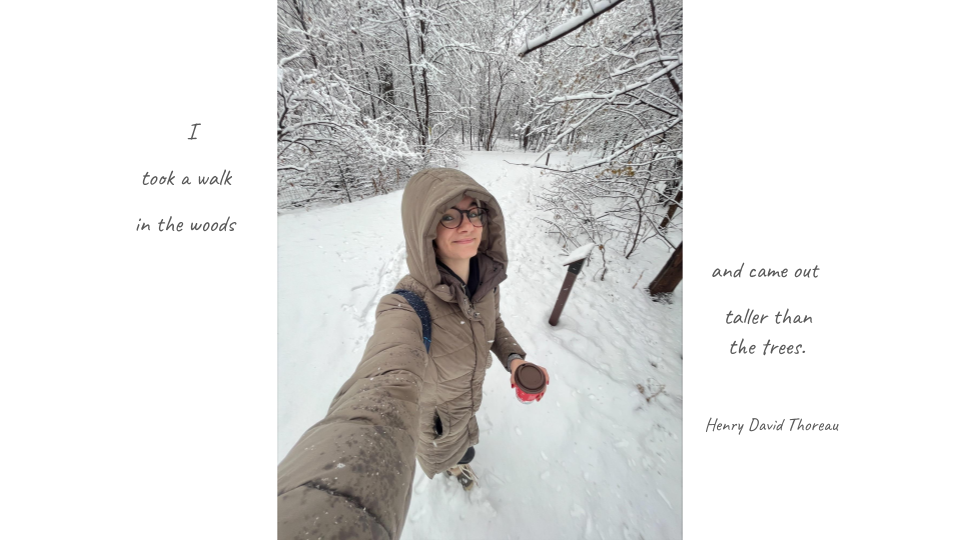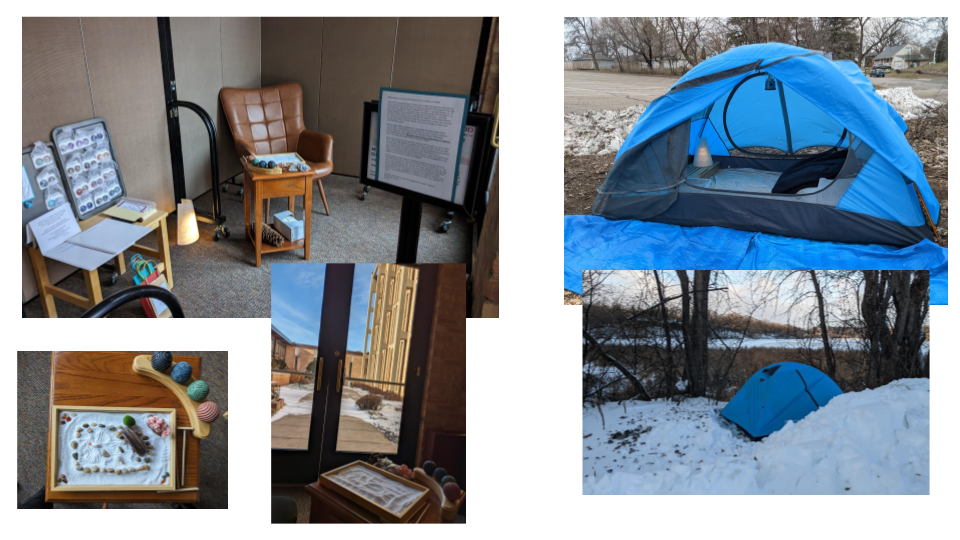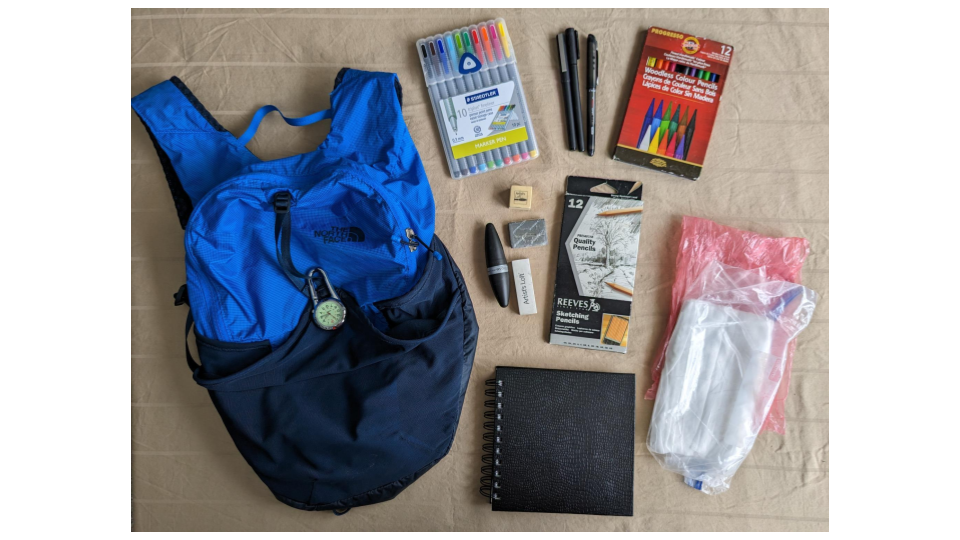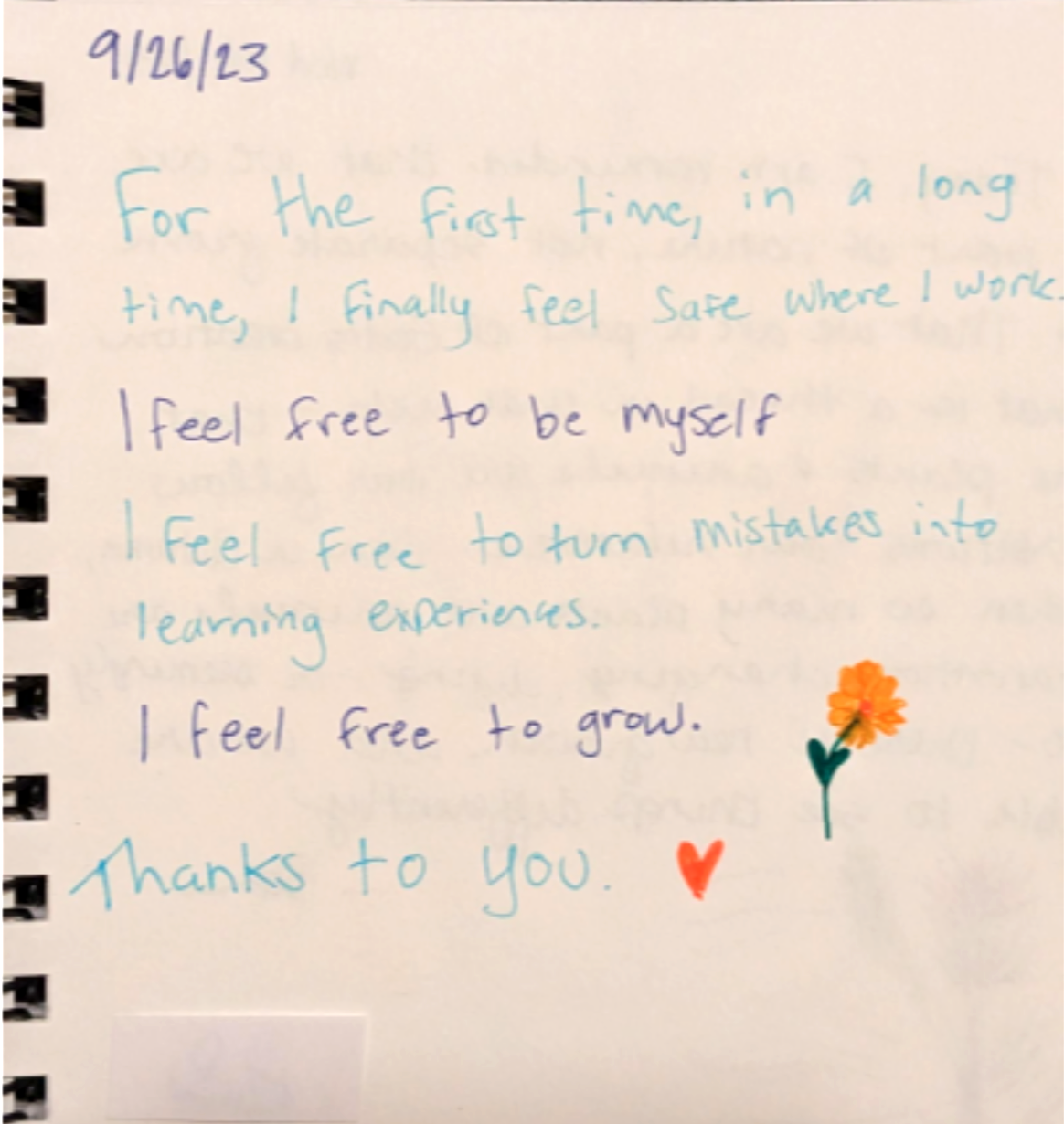The Value of Individual and Organizational Self-Care in Nature
Karen Walburg
Karen has been teaching and leading nature programming at Westwood Early Childhood Center for over 35 years. She is an advocate for the well-being of early childhood educators, especially in nature. She is open to assisting other organizations in recognizing the value of Self-Care in Nature and to bringing the subsequent benefits to their members and communities. She can be reached at k.walburg@westwood.church
This is the story of the evolution of an idea, as seen through the lens of the inspiration of Reggio Emilia. The Reggio way of seeing the world is an expression of universal truths and the natural world of which we are a part.

In this story we will see an example of those truths playing out for the educators and staff at the Westwood Early Childhood Center (WECC). Using a continuous cycle of Observation, Possibilities and Actualities, we will share a long-term investigation into the value of our place in and with nature as crucial to our well-being. In more or less apparent ways, you will find Reggio inspiration embedded in every step of this investigation.
Observations
For many years, the WECC observed the value of experiences in and with nature for the well-being of children, staff, families and the entire WECC community. We observed that staff well-being translated into deeper, richer and higher quality care and relationships with the children and the community. Two and a half years ago, we also observed that our current staffing situation and other resources might allow us to realize a dream of providing those kinds of experiences in the form of restorative time alone in nature for all staff during their busy work days. Using these and other observations, we developed the WECC’s Self-Care in Nature (SCN) initiative. The initiative’s tentative Mission Statement and Guidelines reflect an ongoing evolution of observations, possibilities and actualities.
WECC’s Self-Care in Nature tentative Mission Statement
WECC believes there are spiritual, emotional, physical, mental, social, recreational and environmental benefits to taking time alone in nature. The Self-Care initiative gives educators and staff time during their work days, away from other commitments to WECC, to focus on their own self-care and access those benefits. Through work and life, the effects of those benefits are consequently spread to the wider WECC community and the world beyond.
WECC’s Self-Care in Nature tentative Guidelines
- Self-Care in Nature time must be spent for self-care alone in or around nature.
-
Self-Care in Nature will occur at locations agreed upon by educator/staff person and administration.
-
Cell phone use is permitted only for the purposes of photography, music conducive to self-care or to research discoveries made while in self-care time.
-
Self-Care in Nature time may include required reflections such as an entry into a shared journal during allotted time.
Possibilities
Four key possibilities were initially identified:
Logistics - Would our resources be sufficient to support the establishment and maintenance of this initiative?
Benefits - What could/would the benefits be for individuals, the organization, the community and beyond? What would the cost/benefit ratio be?
Evolution - In what ways would/could the initiative evolve? What might drive those changes?
Replicability - Would others see the value in this practice? Would there be a desire to replicate this initiative in other settings/organizations? If so, how might that happen? What could it look like? What part might we play in that exploration?
These possibilities overlapped in many ways as the actualities of this initiative took shape.
Actualities
Logistics - We discovered that we did indeed have the resources to begin this initiative.
Each educator/staff person is offered 1 or 1.5 self-care hours in nature (depending upon variables) approximately every 2-3 months. Our goal is that everyone will have at least one turn during each of the four seasons. Feedback from educators and staff reflected a desire for more SCN time, to experience the benefits received from that time. Although we are not able to provide more during working hours, staff have found ways outside of work to spend more time in nature either alone or with family or friends.
The staff person who schedules creates an SCN schedule that is basically repeatable for every rotation, with vacations, illnesses, etc. included.
The educator/staff person’s time out is covered by an on-staff float teacher who is qualified to fill each person’s position for that time frame. In our case, this float teacher also provides occasional opportunities for creative expression during a person’s SCN times. She also documents participants’ reflections to share with the WECC community.
We have access to a lakeshore woodland trail onsite. We began our initiative exclusively using this access for SCN.
During the winter months we set up a small tent near the lakeshore, with a battery powered heated blanket, microwaveable heat wrap for the neck and warm beverages available. When the Minnesota cold makes even warm tent time impractical, we have set up an indoor space with an outdoor view.

During the summer months there are cold beverages available. A portable sand play therapy tray is available for use during any SCN time.
Many participants share that this initiative and these added touches show how deeply they are appreciated and cared for by the organization. This feeling and knowledge of being valued contributes greatly to the well-being of the individual as well as the organization.
Benefits
We created a backpack to be taken along each SCN hour.

The backpack contains a shared journal and pencils, pens, colored pencils and markers to make entries into the journal. We ask that during each SCN hour, a journal entry or another form of documentation be made. This documentation serves as a way for participants to reflect upon their experience and share it with others. It can be as simple or as complex as the author/illustrator desires.

“For the first time, in a long time, I finally feel safe where I work. I feel free to be myself. I feel free to turn mistakes into learning experiences. I feel free to grow. Thanks to you.”
The value and benefits of journal entries go beyond self-expression, insights, memories, gratitude, spiritual connection and cathartic release for the author/illustrators of the entries. They include the benefits of shared experiences and feelings with the wider community, now including you.
Evolution
The position of the float teacher was originally a volunteer role. Over time, after weighing the cost/benefit ratio, it was determined that the benefits merited the cost of making the position a paid role in the program. This shift also better reflected the embrace of the initiative by the entire organization.
Weather and other factors dictated that we expand our options for agreed-upon locations for a person’s SCN time. Locations now include the small wooded lakeside area on our campus, a nearby nature center and a few other sites close enough that the majority of the hour could still be spent alone in nature.
For the first year there was no structure to the time; it was entirely left to the participant to choose how the hour alone in nature was spent. The second year, we added the occasional opportunity for artistic expression, which was always optional. The third year, we added more in-depth learning opportunities about self-care. Extra time was given for reading and journaling as a more structured approach, but we soon realized that the structure could be too limiting. The learning opportunities were subsequently made available in a more ongoing model, available at any time and without expectations.
Replicability
WECC has found the benefits of this initiative to be varied, impactful, far-reaching and replicable. We have given presentations about this initiative at conferences and gatherings, working with individuals and groups interested in beginning similar practices.